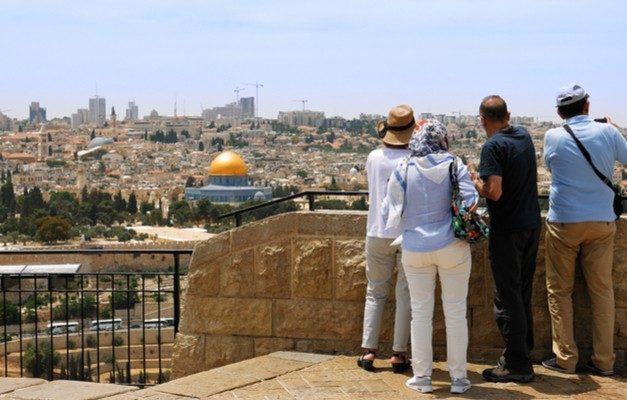The first-ever international tourism and security conference in Jerusalem will discuss how to manage media during crises that could affect tourism – and in turn, whole economies.
By: Batya Jerenberg, World Israel News
The First International Tourism and Security Summit will take place in Jerusalem October 7-9, with the aim of providing practical tools for managing global tourism in an age when bad news can fly across the world at the click of a button and affect the travel plans of millions of people.
Although the main subject will be developing, maintaining and promoting tourism despite terror attacks, as hinted to in the name, the techniques discussed will also be applicable to other crises that hit the news, such as natural disasters instead of man-made ones.
The conference is a joint venture of the Ministry for Jerusalem Affairs and Heritage, Ministry of Tourism, the Jerusalem Development Authority (JDA) and the Israel Incoming Tourism Operators Association.
While Israel – and especially Jerusalem – has unfortunately had vast experience in dealing with terror attacks, it is also managing to overcome the damaging image of being a “dangerous” place to visit, according to Ilanit Melchior, director of tourism for the JDA and one of the main conference organizers.
World Israel News caught up with Melchior to discuss what Israel can bring to the table.
Israel in general, and Jerusalem in particular, have seen many terror attacks, and yet it has been reported for the last few years that the country keeps breaking its previous annual record of incoming tourists. Why is that?
It’s true, over the last decade we’ve had an average growth of over 28%. Because Jerusalem has the right toolbox to deal with it (terrorism). Because we have the experience as a city and as a country, it became a strength to know how to manage this crisis, how to continue that event.
We know which segment and which tourists are more sensitive to terrorism and which are less. Americans, for example, especially group tours, are very sensitive to it — because of insurance issues. Europeans are less sensitive. But individuals have short memories. It’s an issue they speak about for four or five days but after that few cancel.
So we changed our strategy to target individuals, and hired local representatives for Jerusalem in various European countries – and now beginning in China – to teach us about our clients, what interests or affects them most. Now 60% of visitors are individuals. And when someone is looking for an urban tourism experience then Jerusalem will be one of their options in the same line as they look at Berlin, Rome, Prague and other cities of that character.
What are some of the practical tools for dealing with crises will you be suggesting, before, during and after they occur?
We learned to frame the narrative of the story and not just let the international media talk about the terrorism that occurred. We stepped in, learned to use social media, provided tour operators with facts – we didn’t leave a vacuum.
And instead of trying to hide that we have extra security checks, we provide conference organizers in advance with the information that upon landing, there will be a security check “for your own safety,” that bags will be checked at the entrance to the conference center, again, “for your own safety.” That way, instead of feeling uncomfortable when it happens, they appreciate it.
When something is actually happening, we send out our social media guy to find tourists at the place and ask them kindly if they would share their experiences of the city, and then immediately post it online. For example, during the knife intifada, if someone was stabbed in Jerusalem, an hour and a half later you see nothing anymore. So you don’t hide that there was danger, but feeling danger is very individualistic, it’s a perception. When others hear people speaking in their own language about what a good time they’re having, it has a huge effect.
What is the main problem this conference is coming to address?
There’s still a gap in terms of preparedness. The different partners aren’t necessarily speaking together or seeing eye to eye. For example, the Homeland Security Department in the United States is responsible for security, and they’re not necessarily thinking that when they’re speaking on an international basis that they’re affecting tourism. There should be a round table so that before something happens, representatives from the government, from security, tourism and other authorities work out the problem in a much more integrated way, because it can affect the economy for months after.
It’s an alert for our government too. The fact that the prime minister is sitting at weekly cabinet meetings and they’re talking about [an event] from the security point of view, doesn’t mean they’re thinking of it in terms of image and perception.
For the first time, we as a city are putting on the table that there are destinations being hurt by terrorism — and we’re not running away from the problem. We want to get cooperation from cities around world, and [in this context] representatives are coming from the OECD and the UN too. We’ll sign an amendment calling on cities to share their experiences, their know-how, and not be afraid.





